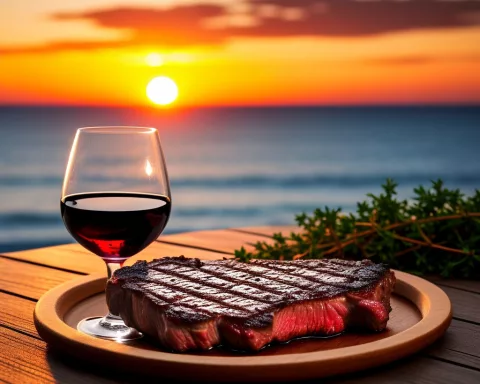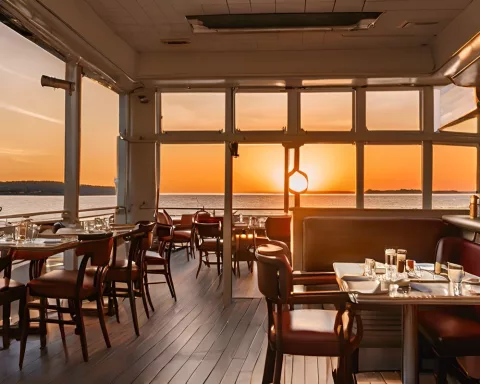Cape Town’s food scene is a lively mix of joy and sadness. The beloved restaurants Cheyne’s and Lucky Bao have recently closed, leaving a big gap in the hearts of their loyal fans. Yet, there’s a bright side! La Colombe has been celebrated as one of the world’s best restaurants, bringing pride to the city. Chef James Gaag creates stunning dishes that are a feast for both the eyes and the taste buds, ensuring that Cape Town remains a delicious place to explore.
What is the culinary landscape like in Cape Town?
Cape Town’s culinary landscape is a dynamic mix of triumphs and losses. While beloved establishments like Cheyne’s and Lucky Bao have closed, La Colombe shines, recently ranking 49th among The World’s 50 Best Restaurants. This contrasts the city’s ongoing gastronomic innovation with nostalgic farewells.
A Revered Culinary Landscape
Cape Town has continuously held a prestigious position in the global culinary scene, known for both its rising stars and its poignant goodbyes. One recent and particularly heartbreaking closure is that of Cheyne’s in Hout Bay. For a decade, Cheyne’s, named after the renowned chef Cheyne Morrisby, stood as an emblem of Modern Asian Cuisine. The announcement of its closure through a Facebook post left its devoted patrons in profound disappointment.
Cheyne’s offered more than just a meal; it presented an immersive culinary voyage through the bustling streets of Asia, all within the serene ambiance of a coastal suburb. The restaurant’s design, a harmonious blend of modern minimalism and delicate Eastern touches, provided a backdrop where the setting was as integral to the experience as the cuisine itself. The outpouring of sorrow and fond memories in the comments section of the announcement showcased the deep bond diners had with this beloved establishment.
The shutdown of Cheyne’s also marked the end of its sister eatery, Lucky Bao. This casual yet flavorful Asian Street Food restaurant was a hit among those looking for a quick, high-quality bite. The sudden disappearance of these culinary treasures leaves a significant void in Cape Town’s dining landscape, underscoring their profound influence on the local community.
The Rise of La Colombe
Amid the sorrow of these closures, Cape Town finds solace and pride in the international acclaim garnered by another of its culinary stalwarts, La Colombe. Recently, a South African website announced that La Colombe has been ranked among The World’s 50 Best Restaurants, securing the 49th spot. This accolade not only celebrates Cape Town’s culinary innovation but also crowns La Colombe as the best restaurant in Africa.
The World’s 50 Best Restaurants 2024 list was unveiled at a dazzling ceremony held at Wynn Las Vegas, attracting the elite of the culinary world. This 22nd edition showcased restaurants from 26 territories across five continents, emphasizing the global diversity and dynamism in gastronomy.
La Colombe, situated atop the Silvermist Wine Estate, offers diners an enchanting experience. Since its relocation from Constantia Uitsig in 2014, the restaurant resembles a whimsical treehouse, providing a tranquil setting for Chef James Gaag’s culinary masterpieces. The minimalist décor, characterized by muted tones, ensures that the intricate dishes remain the focal point. Each course is a visual and gastronomic spectacle, reflecting the art of culinary theater.
Chef Gaag’s Masterpieces
Chef James Gaag’s creations, such as the aromatic Cape Malay snacks and the innovative tuna ‘La Colombe,’ epitomize the seamless fusion of tradition and modernity. The latter, a delicate yellowfin tuna dish garnished with micro herbs, avocado puree, and a rich umami broth, showcases his inventive flair. Another standout is the Karoo lamb, which demonstrates Gaag’s exceptional skill in achieving complexity and harmony in his dishes.
The dining journey at La Colombe is further enhanced by its meticulously designed tasting menus. Patrons can choose between an eight or ten-course experience, each crafted to offer a playful yet sophisticated culinary adventure. The unique option for guests to select their canapés at the start of the meal adds a personalized touch, ensuring that each visit feels distinct.
Being located on a wine estate, La Colombe’s wine selection is nothing short of extraordinary. Each wine is carefully chosen to complement the dishes, elevating the overall dining experience. The restaurant also offers thoughtfully curated low and no alcohol by volume (ABV) options, catering to a wide variety of preferences.
A City of Culinary Contrasts
While La Colombe’s recognition brings joy and prestige to Cape Town, it also highlights the juxtaposition within the city’s culinary scene – the celebration of new peaks alongside the grief of farewells. The mention of Disfrutar in Barcelona taking the No.1 spot on this year’s list serves as a reminder of the global competition and the relentless pursuit of culinary excellence.
The closure of Cheyne’s and Lucky Bao underscores the challenges facing the restaurant industry, particularly in a world still recovering from the pandemic. Nevertheless, the success story of La Colombe exemplifies resilience, innovation, and the unwavering spirit of chefs and restaurateurs who continue to push the boundaries of gastronomy.
Cape Town’s culinary landscape is a rich tapestry woven with flavors, stories, and experiences. While the doors of Cheyne’s and Lucky Bao have closed, their legacy will endure in the memories of those who dined there. Meanwhile, La Colombe’s international recognition assures food enthusiasts that Cape Town remains a vital, dynamic destination for culinary exploration and innovation.
In conclusion, Cape Town’s gastronomic journey is marked by emotional farewells and triumphant ascensions, reflecting the city’s vibrant and ever-evolving culinary ethos.
“`markdown
What is the current state of Cape Town’s culinary scene?
Cape Town’s culinary scene is a dynamic landscape characterized by both joyful achievements and poignant losses. While beloved restaurants like Cheyne’s and Lucky Bao have recently closed, La Colombe has received international acclaim, ranking 49th among The World’s 50 Best Restaurants, thus highlighting the city’s ongoing gastronomic innovation.
Why did Cheyne’s and Lucky Bao close?
Cheyne’s, a prominent Modern Asian Cuisine restaurant in Hout Bay, closed after nearly a decade, leaving its loyal patrons heartbroken. Lucky Bao, its sister establishment, also shut down, which has left a significant gap in Cape Town’s dining options, especially for those who cherished their flavorful Asian street food offerings.
What makes La Colombe a standout restaurant?
La Colombe stands out due to its recent recognition as one of the best restaurants globally, ranking 49th on The World’s 50 Best Restaurants list. Located atop Silvermist Wine Estate, it offers an enchanting dining experience under the guidance of Chef James Gaag, known for his visually stunning and flavorful dishes that fuse tradition with modern culinary techniques.
What type of dining experience can customers expect at La Colombe?
Customers at La Colombe can expect a unique dining journey featuring meticulously crafted tasting menus that offer either eight or ten courses. Each dish is designed to be a playful yet sophisticated adventure, complemented by an extraordinary wine selection and thoughtfully curated low and no alcohol options.
How does Chef James Gaag incorporate local flavors into his dishes?
Chef James Gaag’s dishes, such as the Cape Malay snacks and the innovative tuna ‘La Colombe,’ showcase a seamless blend of local tradition and modern culinary flair. His creations are designed to highlight the rich flavors of South Africa while presenting them in a sophisticated, contemporary manner.
What does the closure of these restaurants mean for Cape Town’s food culture?
The closure of Cheyne’s and Lucky Bao signifies the challenges faced by the restaurant industry, particularly in light of the pandemic. However, it also emphasizes the resilience and innovation present in Cape Town’s culinary culture, as exemplified by La Colombe’s success. This contrast reflects the city’s vibrant yet evolving gastronomic ethos, where cherished memories coexist with new culinary triumphs.
“`












